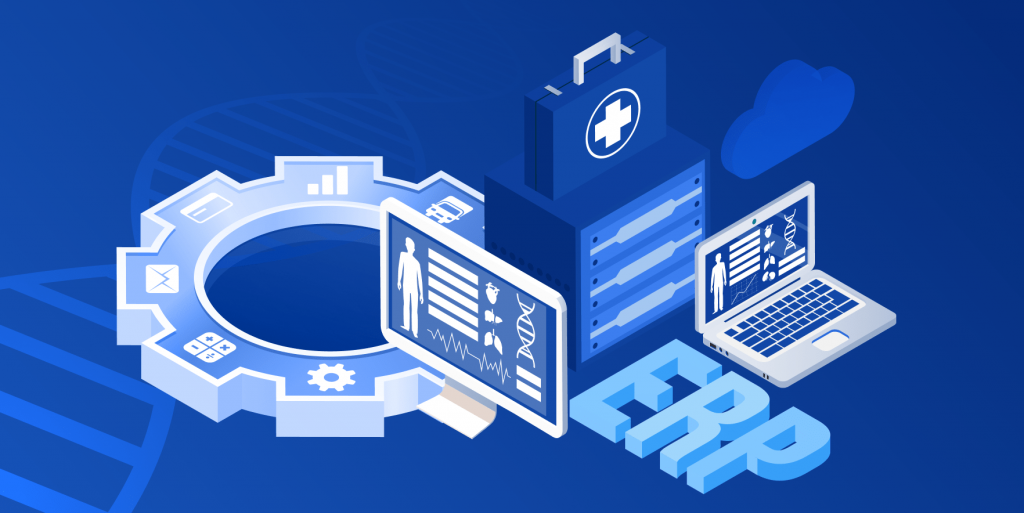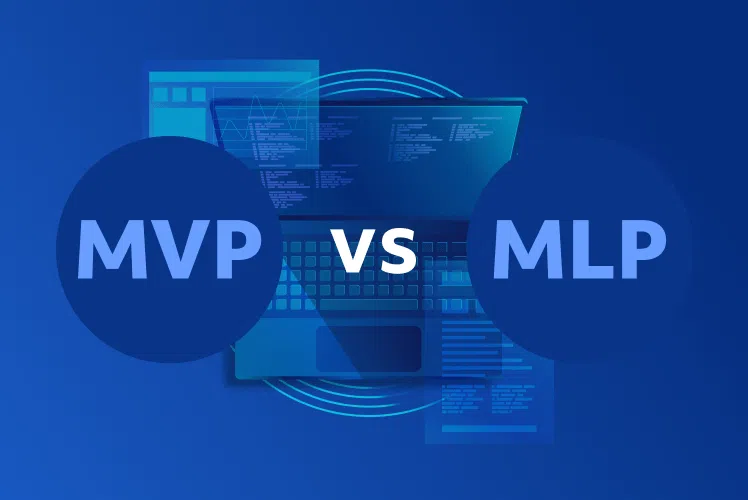Table of Contents
Although enterprise resource planning systems are traditionally linked with industries like manufacturing and retail, their recognition and use in the healthcare sector are on the rise. In this article, we will explore the role of ERP for healthcare, its advantages, challenges, and the implications for patient care.

What is ERP?
Enterprise Resource Planning (ERP) systems help businesses organize and manage their assets and activities, like keeping track of inventory, or handling finances. Such a system acts like a central hub, making it easier for everyone in the business to work together and share information across departments.
The deployment options for them vary, including:
- On-premise, which follows the traditional model of maintaining software and hardware within the organization’s physical premises.
- Cloud-based, where the software and data storage occur on remote servers managed by a third-party provider. Access is facilitated over the internet through web browsers or dedicated client software.
- Hybrid, a deployment model that combines aspects of both on-premise and cloud-based solutions. Organizations using a hybrid approach keep some ERP components on-premise, while utilizing cloud services for others.
The choice between on-premise, cloud-based, and hybrid ERP solutions involves careful consideration of various factors, including an organization’s budget, security, scalability, and customization requirements.
The role of ERP systems in healthcare management
The healthcare industry deals with various challenges that affect the quality, efficiency, and access to care. From data processing issues to regulatory compliance and technical resource limitations, healthcare professionals have to manage the most various processes and tasks in an effective and patient-centric manner.
Conventionally, health providers utilize distinct software for data management within each department. The implementation of an ERP system facilitates the collection, storage, and management of data across the entire facility, expediting information sharing and eradicating data silos.
Medical ERP systems combine various functions, such as:
- Streamline administrative and financial operations
- Enhance patient care and information management
- Inventory control and supply chain management
- Regulatory compliance and data security
As the healthcare industry continues to evolve, the role of these systems in driving innovation and operational excellence is poised to expand further. The integration of advanced technologies such as artificial intelligence, predictive analytics, and interoperable data exchange empower ERP healthcare solutions to deliver more personalized, efficient, and patient-centric care.
Tap into Healthcare IT Services by SoftTeco and learn how we can leverage your processes
Things to consider when developing ERP healthcare solutions
Developing enterprise resource planning solutions for the healthcare industry comes with its own set of considerations, such as:
Adherence to regulations and information security.
Meeting industry standards and regulations like HIPAA and GDPR is non-negotiable. A good healthcare ERP solution should prioritize the security of data, patient privacy, and regulatory compliance to protect sensitive information. To strengthen the system against potential breaches, it is essential to implement encryption protocols, access controls, and regular security audits.
Compatibility and integration
Seamless integration with existing healthcare systems, such as electronic health records (EHR), laboratory information management systems (LIMS), and practice management software, is important. It ensures data consistency and interoperability, enabling healthcare providers to access comprehensive patient information from a centralized platform. The ERP system in healthcare should be designed to facilitate smooth data exchange regardless of the platform or system in use.
User-friendly interface
An intuitive and user-friendly interface is important for increasing user adoption and reducing training time. The ERP systems in hospitals should prioritize easy navigation, efficient task completion, and personalized user experiences to meet the diverse needs of healthcare professionals, including physicians, nurses, and administrative staff.
Scalability and customization
As healthcare organizations evolve and expand, their enterprise resource planning solutions must be able to scale to accommodate growing volumes of data and increasing operational complexities. Additionally, the ability to customize the system to meet the specific needs of different healthcare specialties and practices is essential to ensure that it aligns with the unique requirements of the industry.
Analytics and reporting capabilities
ERP solutions should offer robust reporting and analytics capabilities that enable administrators to monitor key performance indicators, track patient outcomes, and identify areas for process improvement. Advanced analytics can also support predictive modeling and risk assessment for better clinical decision-making and resource allocation.
Change management and training
Developers need to consider the importance of change management strategies and provide comprehensive training and support to ensure that healthcare staff can adapt to the new system effectively.
Key components of a healthcare ERP
ERP systems have become an essential tool for managing complex operations in various industries. When it comes to healthcare, the specific needs and challenges of the industry require ERP solutions to be tailored to meet those requirements. Thus, these systems encompass a wide array of modules and functionalities.
Let’s take a closer look at some of the key modules for healthcare enterprise resource planning.
- Patient information management. This module focuses on streamlining patient registration and appointment scheduling. It also includes features for tracking patient demographics, medical history, treatment plans, insurance details, and visit histories.
- Inventory management. Effective management of medical supplies, pharmaceuticals, and equipment is critical for healthcare facilities. ERP systems with inventory management modules enable real-time tracking of inventory levels, automated replenishment, expiry date tracking, and cost control.
- HR management module. This component helps in managing healthcare staff, including scheduling, payroll, training, and performance evaluations, ensuring that the right personnel are available to deliver care when needed.
- Financial management. ERP healthcare solutions streamline financial processes, including billing, invoicing, and claims management. These features help healthcare organizations optimize revenue cycles and ensure accurate financial reporting.
- Reporting and analytics. These systems provide customizable dashboards, key performance indicators (KPIs) tracking, and real-time reporting functionalities, empowering administrators to monitor operational efficiency, financial performance, and patient outcomes.
- Electronic health records (EHR) integration. Integrated EHR module digitally stores patient health info—history, diagnoses, treatments, and more. Ensures easy access, enhancing care coordination and outcomes.
Benefits of implementing ERP in healthcare
Implementing ERP in the healthcare sector brings forth a multitude of benefits that directly address the industry’s unique challenges and demands. That includes:
Improved operational efficiency and cost reduction
The integration of various functions, including inventory management, billing, scheduling, and patient records, allows for the streamlining of administrative processes and the automation of routine tasks. This reduces the need for manual data entry, leading to improved efficiency and productivity. Staff can then focus on more critical tasks and patient care. Additionally, automation helps reduce operational costs and optimize resource utilization.
Enhanced patient care
Efficient access to patient data enables healthcare providers to make informed decisions swiftly, positively impacting patient outcomes. Moreover, the system notably enhances the quality of patient service, as doctors no longer waste time on paperwork or searching for patient information, allowing them to dedicate more time to patient care. Additionally, ERP facilitates seamless communication and collaboration among healthcare teams, ensuring that critical information is readily available to those involved in a patient’s treatment.
Ease in the inventory management
ERP systems provide comprehensive inventory management capabilities, allowing healthcare organizations to monitor stock levels, track expiration dates, and optimize supply chain processes. By maintaining accurate inventory records and implementing automated replenishment systems, healthcare facilities can minimize waste, reduce stockouts, and ensure the availability of essential supplies.
Preservation of patients records for future reference
The implementation of ERP in healthcare facilitates the digitalization and centralization of patient records, ensuring that critical health information is securely stored and easily accessible when needed. This not only improves the continuity of care but also enables healthcare providers to track patient histories, monitor treatment outcomes, and make informed decisions based on comprehensive and up-to-date information.
A Deep Dive Into Healthcare Chatbots
The healthcare industry is constantly embracing technological advancements, as every new innovation brings significant improvements to patient care and to work processes of medical professionals. And while some innovations may be too complex or expensive to implement, there is one that is highly affordable and efficient, and it’s a healthcare chatbot.
Real-time multi department communication
In a dynamic healthcare environment, effective communication between different departments is vital. The system enables real-time multi-department communication, enhancing collaboration, decision-making, and the overall coordination of care, ultimately leading to a smoother and more integrated healthcare ecosystem.
Implementation challenges
The implementation of ERP in healthcare industry can encounter several challenges that need to be carefully addressed to ensure successful integration and utilization.
Data security concerns
One of the primary challenges in implementing ERP systems in healthcare settings is the need to maintain robust data security. Healthcare organizations handle vast amounts of sensitive patient data, and any breach or compromise can have severe consequences. To address this challenge, healthcare providers need to invest in robust cybersecurity measures, encryption protocols, and access control mechanisms to safeguard patient information. Additionally, compliance with data protection regulations such as HIPAA is crucial to ensure the secure handling of patient data within the healthcare ERP system.
Integration with existing systems
Healthcare organizations often have a complex network of existing systems and software applications that are integral to their operations. Integrating a new ERP system with these legacy systems can be a daunting task. Compatibility issues, data migration challenges, and interoperability concerns can arise during the integration process. To overcome this challenge, healthcare providers should conduct a thorough assessment of their existing infrastructure, develop a comprehensive integration strategy, and leverage middleware solutions to facilitate seamless data flow between the ERP system and other systems.
Lack of IT expertise
Implementing and managing an ERP system requires a high level of technical expertise, which may be lacking within the healthcare workforce. Healthcare providers often struggle to find IT professionals with the specialized skills and knowledge required to oversee ERP implementation, configuration, and maintenance. Addressing this challenge entails investing in staff training and development programs, partnering with external IT service providers, or engaging ERP vendors that offer comprehensive support and training services to bridge the expertise gap.
Limited budget
Budget constraints are a common hurdle in implementing ERP systems. The cost of acquiring, customizing, and maintaining an ERP system can be substantial, especially for smaller healthcare facilities or non-profit organizations. To address this challenge, healthcare providers can explore cost-effective ERP solutions, consider cloud-based deployment models to minimize infrastructure costs, and prioritize key functionalities that align with their operational needs and strategic objectives.
Customization challenges
Every healthcare organization has unique processes, workflows, and requirements that necessitate customization of the ERP system to align with their specific needs. However, excessive customization can lead to complexity, increased costs, and potential issues with system upgrades and maintenance. Healthcare providers should strike a balance between tailoring the ERP system to meet their specific needs and leveraging standard best practices to minimize customization challenges.
Expert Opinion
ERP systems in healthcare are excellent tools for optimizing processes, increasing efficiency, and improving patient care quality. However, their implementation requires significant financial investments and a professional approach to integration with existing systems. Despite the complexity, the proper use of ERP systems can significantly enhance the operation of medical institutions by increasing transparency, resource control, and compliance with regulatory requirements. It is also important to understand that an ERP system is just a helpful tool and cannot replace the professionalism of medical personnel.
Conclusion
As technology advances, the future of ERP in healthcare looks promising. Integrating advanced analytics, artificial intelligence, and Internet of Things capabilities within ERP systems can improve operational efficiency, predictive analytics, and personalized patient care. However, organizations must address the unique challenges inherent to the industry to fully harness the benefits of these technologies.


Comments